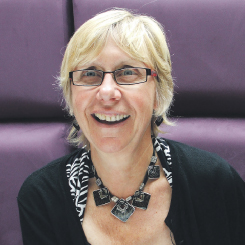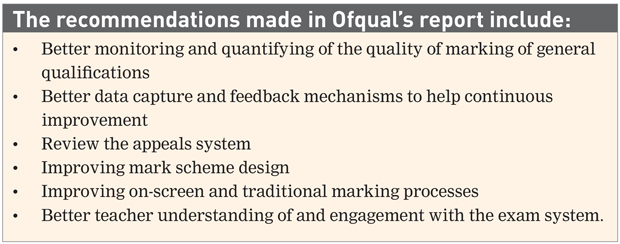Ofqual has announced plans to overhaul the A-level appeals system in England, dubbing it “overly complex” and “opaque” in a report published today.
The qualifications watchdog’s Review of Quality of Marking in Exams in A-levels, GCSEs and Other Academic Qualifications praised the quality of grading, but pledged to review the process when mistakes were made.
It comes after grades on 54,380 GCSEs and A-levels were changed last year following 301,267 enquiries. The figures compare to 28,903 changes from 164,874 enquiries in 2009.
Ofqual said it would “fundamentally re-design” the appeals process, with a new system in place by next year. Exam boards will be asked to provide more data on the quality of their marking and to improve aspects of both onscreen and traditional marking. They will also be expected to contribute to an Ofqual led programme to develop understanding about what makes a good mark scheme, for candidates of all levels.
The move was welcomed by the Association of Colleges’ policy director, Joy Mercer (pictured), who said the current appeal system was ” not transparent, fair or strong enough”.
And Andrew Hall, chief executive at AQA, which sets the papers for around half of all GCSEs and A-levels with nearly 2 million students sitting its exams every year producing more than 7 million exam scripts, said: “We welcome today’s report.
“We know that getting the right results is absolutely crucial for both students and their teachers, and we agree the current appeals system needs to be improved so that it properly addresses genuine marking errors and builds confidence in the exam system.”
Currently there is a six-stage appeals process, which with ‘service one enquiries about results’— a clerical check to ensure all questions have been marked and all marks have been added up correctly.
The final stage is an ‘examinations procedures review service’, a hearing with a panel of senior Ofqual and independent figures.
Last year, 1,950 service one enquiries about results were made, while eight examinations procedures review services were carried out and two were upheld.
The Ofqual report found that many teachers saw this system as “opaque”. It called for teachers to have a better understanding and be more engaged with the system.
Its chief regulator, Glenys Stacey, said: “Our report has found that the overall quality of marking is good. There is much to have confidence in, but there is no doubt that it could be better still.”
More than 16 million exam scripts are marked every year and Ms Stacey acknowledged that mistakes did occur “in a system of this scale”.
“Although genuine mistakes are few and far between, they undermine confidence in the system,” she said.
“The appeals system has been under increasing pressure, particularly from accountability measures and overly complex processes.
“To make our appeals system fit for the future we need to overhaul it. We want a new system that is more transparent, fair and sufficiently robust to differentiate between reasonable variations in marks and genuine marking errors.”

Ms Mercer said: “We feel there is a clear set of recommendations, which particularly support a decision to completely redesign enquiries about results and the appeal system in England.
“We agree that at the moment the system is not transparent, fair or strong enough to demonstrate the difference between variations in marks and genuine marking errors.
“However, Ofqual has highlighted that there needs to be better interaction between teachers and the exam systems… we welcome Ofqual’s understanding that colleges need up-to-date information and a further level of transparency.”
She added that the current situation left many colleges confused over what help they could get from awarding bodies.
Mr Hall said: “It’s important to remember that the process of ensuring students get the right results starts long before an examiner sits down to mark their scripts.
“Dealing with the root causes of the issue is critical and that starts with the design of the qualification, the question paper and the mark scheme guidance, which all have to work well. If they don’t, then there is only so much you can do to put that right further down the line.”
Brian Lightman, Association of School and College Leaders general secretary, said: “The qualifications system is not broken, but aspects of it need to be reviewed and adjusted. The challenge now is for Ofqual and the awarding bodies to put these recommendations into action.
“The fact that we cannot currently compare the quality of marking of qualifications and subjects between exam boards is clearly an area that needs addressing.”
He added that he was hopeful that issues with the appeals system would now be addressed.
“Large inconsistencies or marking errors can have significant consequences for the students affected and the current appeals system does not enjoy the confidence of schools and colleges,” he said.
“We recognise that the enquiries about results and the appeals system need changing. However, we are disappointed that the report gives no indication of the importance of engaging with … leaders on proposed changes. “
He added that Ofqual and the awarding bodies needed to take a lead on improving the understanding of teachers and the general public about how the marking processes work.
 Her photo on the theme of escape, which she took of herself in a graveyard, won the YPA award for best single image and was exhibited at the Calumet Gallery in New York.
Her photo on the theme of escape, which she took of herself in a graveyard, won the YPA award for best single image and was exhibited at the Calumet Gallery in New York.








